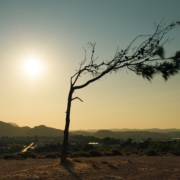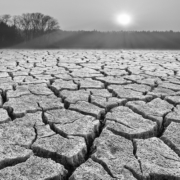The first thing to overcome with the coronavirus is fear. The virus is certainly dangerous. The likelihood is we will need to learn to live with it. A “new normal” will emerge with its own protocols for traveling, meeting, caring for each other, grieving those we lose, and living our lives. Perhaps there will be a vaccine. Certainly we should do everything we can to protect ourselves. But that is different from living in fear. Hafiz said it well:
Fear is the cheapest room in the house.
I’d like to see you in better living conditions.
The coronavirus is a poster child for the world we are living in now. Many think that climate change is the only existential threat. In fact the greatest threat of all is the Global Challenge—the completely unpredictable interaction of several dozen global stressors—environmental, social, and technological.
The coronavirus illustrates how perfectly predictable threats (viral pandemics) disrupt profoundly interconnected and fragile global systems. Financial markets, supply chains, consumer behavior, tourism, healthcare, and both national and global events are all affected by the virus.
The virus was entirely predictable because experts know that this is what happens when humans move ever deeper into fragmenting ecosystems where viruses jump from their animal and other hosts to human beings. We know more lethal viruses will appear again as they have repeatedly in the past.
The Global Challenge consists of several dozen global stressors. Other names for the Global Challenge include the global problematique, the human dilemma, and the online acronym TEOTWAWKI—the end of the world as we know it. Scientists call the Global Challenge a wicked problem. Here is the Wikipedia definition:
A wicked problem is a problem that is difficult or impossible to solve because of incomplete, contradictory, and changing requirements that are often difficult to recognize. It refers to an idea or problem that cannot be fixed, where there is no single solution to the problem…Because of complex interdependencies, the effort to solve one aspect of a wicked problem may reveal or create other problems.
Think of the Global Challenge as the “perfect storm.” We are in a period widely called the Anthropocene. The Anthropocene can be envisioned as an evolutionary bottleneck. The biosphere—and all the biodiversity it contains—has entered a bottleneck: a funnel created by the sum total of all these global stressors. Only a portion of life as we know it will emerge. Whether humans or some successor species will be part of what emerges is unknown. What kind of world we/they will inhabit, with what kind of values and norms, is also unknown.
But fear, hopelessness, and cynicism aren’t the only choice in the face of this perfect storm. We have lived through many perilous circumstances on our journey so far. The black plague killed one third of the population of Europe. Fortune favors the prepared. The best way to face the perfect storm is to acknowledge its reality and to prepare for different forms of what the visionary scientist Jem Bendell has called “deep adaptation.” While Bendell’s use of the term deep adaptation refers specifically to the climate crisis, the term is equally applicable to the perfect storm of the Global Challenge.
Some believe the Global Challenge will inevitably lead to civilizational collapse. The situation is far more subtle, and indeed more hopeful. Nate Hagens, one of the great thinkers on the Global Challenge, believes it is far more likely humanity will “bend but not break.” William Gibson, the science fiction writer, puts it well when he says “the future is already here. It is just not very evenly distributed.” It is in the nature of the Global Challenge that we can’t predict what combination of global stressors will result in what outcomes, when, where, or how. This view is called being “trigger agnostic.” We don’t know what will trigger what, when, where, or how.
There is authentic hope for us here. We can hope to “bend but not break.” We can hope that cultures and civilizations will find unanticipated ways to adapt to the perfect storm we are facing. We can hope that “deep adaptation” leads to courageous and creative new forms of resilience.
We know the world won’t look the same in 20, 40, 100, or 200 years. But we can hope for and fight for the survival of the core values we take to be at the heart of what it means to be human. We can hope for the survival of love, wisdom, and compassion for others and for the creation.
We can hope to build a better, wiser, more caring, more just and greener world on the ashes of the old world.
Resilience is not something we need to teach people. Resilience flows directly from the deepest human instincts of loving and caring. We instinctively seek to survive ourselves and to help all those we love and care for to survive and flourish. In fact, we often care more about others than we do about our own survival.
As the perfect storm envelops us—as the future shocks become ever more intense and frequent—people all over the world face the existential question of what they and those they love will need to survive. Refugees have to decide what to carry with them. Those who stay where they are have to decide what they will need in order to stay.
Human beings have certain irreducible needs. Air, warmth, water, food, shelter, clothing, community, health care, safety, a shared story about ourselves, and some sense of hope and meaning in our lives. Fear, cynicism, and despair are rarely the best strategies for survival and resilience. The coronavirus cannot be contained. Many among us will be affected by it. But it is far from the greatest challenge we face in the years and decades ahead.
Courage and hope are the most interesting way to live.
—Michael



 michal matlon
michal matlon


 Andrew Horn
Andrew Horn
 by Stanley Wu, Coordinator, the Resilience Project, Commonweal
by Stanley Wu, Coordinator, the Resilience Project, Commonweal
